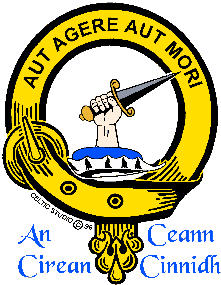|
Abercrombie, Abercromby, Abernethy,Adair, Agnew, Akins, Allardice, Anderson, Anstruther,
Arbuthnott, Armstrong, Arnott, Arthur, Auchinleck, Baillie, Baird,
Balfour , Ballantyne, Balmanno, Bannatyne , Bannerman, Barclay, Baxter ,
Bell, Bethune, Beveridge,
Bisset, Blaine, Blair, Blane, Borthwick, Boswell, Boyd, Boyle, Brisbane,
Brodie, Broun, Brown, Bruce, Brunton, Buchan, Buchanan, Burnett, Burns,
Butter, Byres, Cameron (Modern), Campbell of Argyll, Campbell of
Breadalbane, Campbell of Cawdor, Campbell of Loudoun, Carmichael,
Carnegie, Carr, Carre, Carruthers, Cathcart, Chalmers, Charteris,
Chattan, Cheyne, Chisholm, Clark, Cleland, Clelland, Cochrane,
Cockburn, Colquhoun, Colville, Congilton, Craig, Cranstoun, Crawford,
Crichton, Crosbie, Cumming, Cunningham, Dalmahoy, Dalrymple, Dalzell,
Dalziel, Darroch, Davidson, Dennistoun, Dewar, Don, Douglas, Drummond,
Dunbar, Duncan, Dundas, Dunlop, Durie, Durward, Eliott, Elphinstone,
Erskine, Fairlie, Falconer, Farquharson, Ferguson, Fleming, Fletcher,
Forbes, Forrester, Forsyth, Fotheringham, Fraser, Fraser of Lovat,
Fullarton, Fullerton, Galbraith, Galloway, Garden, Gartshore, Gayre, Ged,
Gibson, Gibsone, Gladstains, Glas, Glass, Gordon, Graham, Grant, Gray,
Grierson, Gunn, Guthrie, Haig, Haldane, Haliburton, Halyburton, Hamilton, Hannay, Hay, Henderson, Hepburn, Heron,
Hog, Hogg, Home, Hope, Hopkirk, Horsburgh, Houston, Hume,
Hunter, Hutton, Inglis, Innes, Irvine, Jardine or Jardin, Johnstone,
Keith, Kennedy, Ker, Kerr, Kincaid, Kinloch, Kinnaird, Kinnear,
Kinninmont, Kirkcaldy, Kirkpatrick, Lammie, Lamont, Langlands, Leask,
Lennox, Leslie, Lindsay, Little, Livingstone, Lockhart, Logan, Logie,
Lumsden, Lundin, Lyle, Lyon, Donald of Macdonald,Macafie,Macalister, Macarthur, MacAulay, MacBain, MacBean,
Macbeth, MacBrayne, MacCallum, Macdonald of Clanranald, Macdonald of
Sleat, Macdonald of the Isles, Macdonnell, Macdougall, Macdowall,
Macduff, MacEwen, Macfarlane, Macfie Ancient, Macfie Modern,
Macgillivray, Macgregor, Machlachlan, MacIan, MacInnes, Macintyre,
Maciver, Mackain, Mackay, Mackenzie of Kintail, Mackenzie of Seaforth,
Mackie, Mackinnon, Mackintosh, Maclaine, MacLaren, Maclean, Maclellan,
Maclennan, Macleod of Lewes, Macleod of Lewis, Macleod of Macleod,
Macmillan, Macnab, Macnaghten, Macnaughton, Macneacail, Macneil, Macneil
(Latin Motto), Macnicol, Macphee Ancient, Macphee Modern, Macpherson,
Macphie (Ancient), Macphie (Modern), MacQuarrie, MacQueen, Macrae,
MacTavish, Macthomas, Maitland, Makgill, Malcolm, Mar, Marjoribanks,
Masterson, Masterton, Matheson, Maule, Maxton, Maxwell, MacCorquodale,
MacCulloch, MacKerrell, Melville, Menteith, Menzies, Mercer, Middleton, Millar, Miller, Mitchell, Moffat,
Moncreiffe, Moncrieff, Monteith, Montgomery, Monypenny, Morehead,
Morrison, Mouat, Mow, Mowat, Muir, Muirhead, Munro, Murray, Nairn,
Napier, Nesbitt, Nevoy, Newlands, Newton, Nicolson, Ogilvy, Ogston,
Oliphant, Orrock, Paisley, Paterson, Patterson, Pennycook, Pentland,
Peter, Pitcairn, Pollock, Porter, Porterfield, Preston, Primrose,
Pringle, Purves, Purvis, Rait, Ralston, Ramsay, Rattray, Riddell,
Roberton, Robertson, Rollo, Rose, Ross, Russell, Rutherford, Ruthven,
Sandilands, Schaw, Scott, Scrymgeour, Sempill, Seton, Shaw, Sinclair,
Skene, Skirving, Smith, Somerville, Spalding, Spens, Spottiswood,
Stewart, Stewart of Appin, Stirling, Strachan, Straiton, Strang,
Strange, Stuart of Bute, Sutherland, Swinton,, Taylor, Thompson, Trotter, Troup, Turnball,
Tweedie, Udny, Urquhart, Vans, Walkinshaw, Wallace, Wardlaw , Watson,
Wauchope, Wedderburn , Weir, Wemyss, Whitefoord , Whitelaw, Wilson,
Wishart, Wood, Young |

